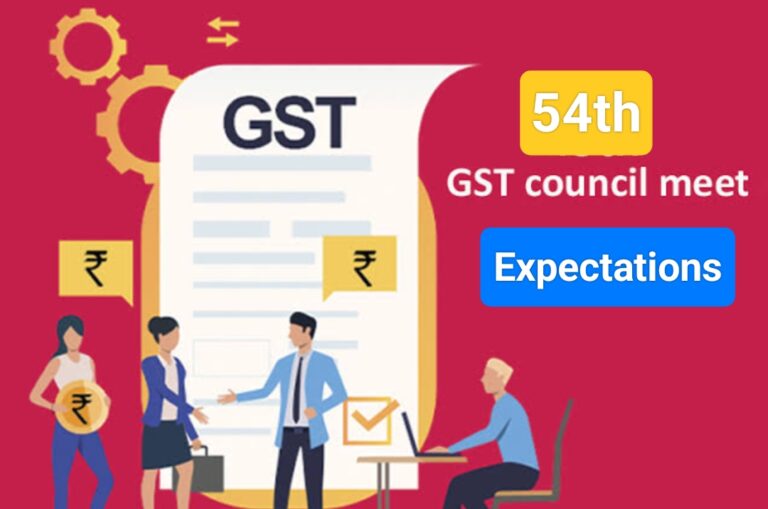With critical sectors like insurance, petroleum, and online gaming under scrutiny, this GST council meeting could set the course for the future of India’s indirect tax system.
The 54th GST Council Meeting is set to take place on September 9, 2024, in New Delhi. Expectations are high as the Council may explore key issues like GST rate rationalisation, trade facilitation, compliance simplification, and the future of the compensation cess.
Let’s delve into the expectations from the upcoming GST Council Meeting.
GST Rate Rationalisation: Moving Towards a 3-Tier Structure
One of the most anticipated discussions revolves around rationalising the GST rate structure from the existing four-tier system to a simplified three-tier system. The Group of Ministers (GoM), chaired by Bihar Deputy Chief Minister Samrat Chaudhary, has proposed retaining the current slabs of 5%, 12%, 18%, and 28% but is still reviewing specific adjustments.
The fitment committee, composed of tax officials, has been tasked with assessing the potential impact of rate changes on certain goods. While a presentation on rate rationalisation is expected, Finance Minister Nirmala Sitharaman has stated that a final decision may only come after subsequent discussions.
Addressing the Inverted Duty Structure
A persistent issue is the inverted duty structure, where the tax on inputs is higher than that on finished goods, leading to the accumulation of input tax credits and increased costs for manufacturers. This affects sectors like paper, furniture, washing machines, solar glass, and air purifiers. The Commerce and Industry Ministry has submitted a list of products to the Finance Ministry to address this concern. The upcoming meeting may provide insights into the GST Council’s approach to resolving this issue.
Future of Compensation Cess
The GST Compensation Cess, introduced in 2017 to compensate states for revenue loss due to GST, has been a contentious topic. Although initially set for five years, the cess was extended until March 2026 to repay borrowings made during the pandemic years. Karnataka has been vocal about the continuation of the compensation cess and its future allocation, particularly post-November 2025, when the central government expects to clear the ₹2.69 lakh crore borrowings. This issue will likely be discussed during the 54th GST Council meeting.
GST Rate on Online Gaming, Horse Racing, and Casinos
In the 50th GST Council meeting, a 28% tax was imposed on online gaming, horse racing, and casinos, sparking debate within the industry. Many fear this could stifle growth and innovation in these sectors. Although a review of this amendment was scheduled for six months after its implementation in October 2023, it is unlikely to be addressed during the September meeting.
GST Exemption for Term Life Insurance Premiums
Another important topic expected at the meeting is the potential GST exemption on term life insurance policies. Currently, all types of health and life insurance policies are taxed at 18% GST. The proposal to exempt term life insurance could make these policies more affordable and encourage demand for pure protection policies. However, investment-linked insurance products are expected to continue being taxed. The government estimates a ₹200 crore revenue loss per year if this exemption is implemented.
Possible Inclusion of Petrol and Diesel Under GST
Section 9 of the CGST Act allows for the future inclusion of petroleum products like petrol, diesel, motor spirit, and aviation turbine fuel under GST. Though no date has been set for their inclusion, speculations suggest the GST Council may discuss this matter. Including these products under GST could potentially impact their pricing, which currently varies across states.
Also Read: GST Council meet to discuss rate rationalisation on September 9
GST on Transactions Between Foreign Branch Offices and Indian Companies
One of the more complex issues is the taxation of transactions between Indian companies and their foreign branch offices. Several large corporations, including Infosys and foreign airlines like British Airways, Lufthansa, and Emirates, have faced GST notices on services imported by Indian branches from their head offices. The Council is expected to offer clarifications on the tax treatment of such transactions, providing relief to affected businesses.
Conclusion
The 54th GST Council meeting holds significant potential for addressing various key issues, from simplifying the tax structure to resolving compensation cess concerns and ensuring better GST compliance. With critical sectors like insurance, petroleum, and online gaming under scrutiny, this meeting could set the course for the future of India’s indirect tax system. Keep an eye on the developments from this crucial meeting on September 9, 2024.
